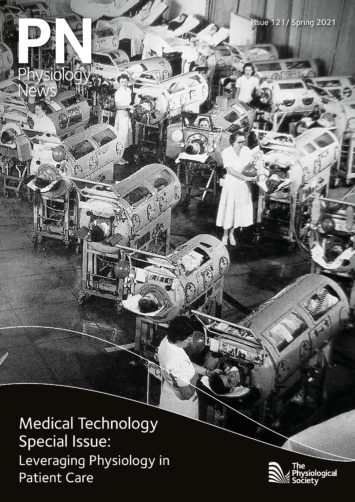
Physiology News Magazine
President’s View: Turning a new leaf, whilst honouring our past
News and Views
President’s View: Turning a new leaf, whilst honouring our past
News and Views
David Paterson, President, The Physiological Society
https://doi.org/10.36866/pn.121.6
A Happy New Year to all of you in these challenging times. This is my first “President’s View” message. I am delighted to have the honour of acting as your spokesperson for the next 2 years. For those of you who do not know me, my day job is Professor of Physiology and Head of the Department of Physiology, Anatomy & Genetics at the University of Oxford, and a Fellow of Merton College, Oxford, UK. As a research-led teaching academic I lecture medical and biomedical sciences students and run a British Heart Foundation (BHF)-funded research group, which is concerned with the neurobiology of cardiac excitability in pathophysiological states. I have been a long-standing member of The Society and was recently Editor-in-Chief of The Journal of Physiology, and prior to that, Editor-in- Chief of Experimental Physiology. In 2018 I co-authored the textbook with Neil Herring, Levick: Introduction to Cardiovascular Physiology (6th edition).
It is important that I use this opportunity to thank Professor Bridget Lumb for her excellent service to The Society over the last 2 years. The Society has accomplished so much under her outstanding leadership, driving The Society forward to be more inclusive and diverse. A key part of achieving this was completing the Governance Review, ensuring that The Society has strong foundations on which to build. Bridget has also championed work in policy that has raised the profile of the discipline with key stakeholders. Her legacy is secured as first female president of The Society, which she has left in very good shape.
I would also like to congratulate all those elected as Trustees at the Member Forum in November 2020: Professor David Attwell as President-Elect, Dr Lucy Green as Chair of Education, Public Engagement and Policy Committee and Dr Daniel Brayson as Early Career Trustee.
I am also pleased to report that in December, Trustees agreed to appoint Professor Paul McLoughlin to Chair of Publications Committee and Dr Catherine Hall to Chair of Conferences Committee. Both members will be taking up their positions at the Member Forum in November 2021 but will shadow the current chair until then.
I believe that physiology faces challenges, but these give rise to opportunities. Particularly important over the last 25 years has been the decline of physiology departments over the UK and the US with physiology often being perceived as a phenotyping tool for the genomics community. Of course, physiology is more than this; it is primarily a discovery science, and is at the core of the medical curriculum with research-led education given to healthcare professionals. At least 58 of The Society’s members have been awarded the Nobel Prize for Physiology or Medicine, from Ivan Pavlov (1905) to Sir Peter Ratcliffe (2019).
The COVID-19 pandemic is certainly going to shape all of our lives, but equally it should not define us. This multi-organ disease has highlighted the unique role that physiology plays in understanding how organ systems communicate in pathophysiological states, and alongside other such areas that The Society is working in, such as understanding why “exercise is medicine” and the ageing process, will place physiology at the fore again. Readers of Physiology News do not need convincing of the importance of our science legacy, but they do need a clear narrative about where we are now and our future.
The phrase that I would like to define my presidency by is: “enhancing the visibility of both the subject area and The Society”.
As a membership organisation we would like to hear what our members have to say about COVID-19 and other topics relevant to physiology and The Society. COVID-willing we will be visiting institutions around the UK and Ireland during the next 2 years. The roadshows should also encourage wider interaction by bringing members and non-members, who have an interest in physiology, together to provide a forum where they can network locally and gain access to new communities.
We need to build our membership both by re-engaging with our core base while reaching out and appealing to new members. We want to be an inclusive and diverse membership and I am fully supportive and enthusiastic about The Society’s newly formed Equality, Diversity, and Inclusion (EDI) Task Force that will be developing a programme of activity and EDI strategy for Trustees to review.
Whilst moving The Society forward is key to maintaining relevance, it is important to acknowledge our heritage and to build on this distinguished past. One of the initiatives that we will be rolling out in 2021 is a Society blue plaque scheme. The aim of the scheme is to celebrate and recognise institutions where pioneering physiologists such as Nobel Laureates and our first women physiologists have made their significant contributions to the discipline. This is part of the wider strategy to raise the profile of the discipline both with the public and with physiologists, increasing the prestige associated with physiology at university departments and highlighting the legacy of physiology academia to potential students.
There is a lot to do, but I hope you will all join me in making sure that the value of physiology is fully valued and continues to thrive. We are all keen to meet again in person. As confidence grows with the vaccine roll-out, the future will be bright again.
Read David Paterson’s article “The real value of research” in the last edition of The Foundation for Science and Technology Journal: foundation.org.uk/Journal
